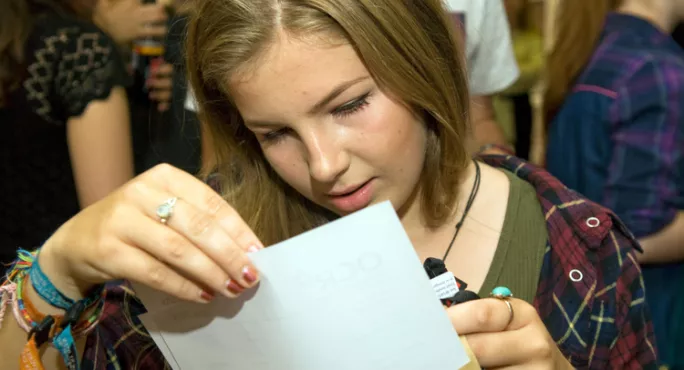The pass rate for English language IGCSEs, taken by one in three 16-year-olds this summer, has risen, according to figures from the exam board Cambridge International Examinations.
The board’s IGCSE results, published this morning, show that 64.6 per cent of pupils who took the English language qualification scored a grade C or above, up from 63.2 per cent last year.
The proportion of pupils achieving top grades has also risen. Some 3.9 per cent of pupils gained an A* in the qualification this summer, up from 3.4 per cent in 2015.
Figures from CIE show that entries for the qualification rose by 4 per cent this year, with more than 224,000 pupils taking the test. The board said a third of all students who took an English GCSE-level qualification this year took its IGCSE in English Language.
Overall, 98.6 per cent of pupils taking the test this year scored at least a G grade, up from 98.2 per cent in 2015.
This year’s rise follows controversy last year, when the pass rate and the proportion of students gaining top grades both fell. The board attributed the drop to a change in the cohort of pupils taking the test, as entries rose by two thirds, but headteachers said they did not trust the results.
Entries for all Cambridge IGCSE examinations in the UK rose to nearly 300,000 in June 2016, an increase of 4 per cent on 2015.
Drop in entries expected
However, entries are expected to fall significantly next year. This is the final year in which IGCSE results will count towards performance table measures for state schools, following a government decision in 2014 to remove the qualifications from league tables.
Michael O’Sullivan, chief executive of Cambridge International Examinations, said: “Cambridge IGCSEs are more popular than ever. They are popular because they are high-quality, internationally respected and have well maintained standards. Schools tell us they like the content of Cambridge IGCSE syllabuses and that their students find it engaging.
“However, it’s disappointing that over 2,000 state schools will have to give up their first choice of qualification from next year, given the decision by the previous secretary of state to exclude even regulated IGCSEs from performance tables.”
A Department for Education spokesperson said: “Every child, regardless of background or ability, should have the opportunity to fulfil their potential and by introducing a rigorous new curriculum with gold-standard GCSEs, we are equipping them with the skills and knowledge to do that.
“Alternative qualifications such as the IGCSE, which have not been through the same approval and quality control process, would potentially undermine the standards of new GCSEs. It is for this reason that from next year these qualifications will not be included in the performance tables.
“Schools, teachers and parents must also be confident the accountability tables provide a clear picture of school performance. We are in continual dialogue with the UK Statistics Authority about how to ensure we are providing the clearest information possible.”
The results have been published ahead of the main GCSE results, which will be out on 25 August. The results of other exam boards’ IGCSE qualifications will also be published on that date.
Want to keep up with the latest education news and opinion? Follow TES on Twitter and like TES on Facebook




